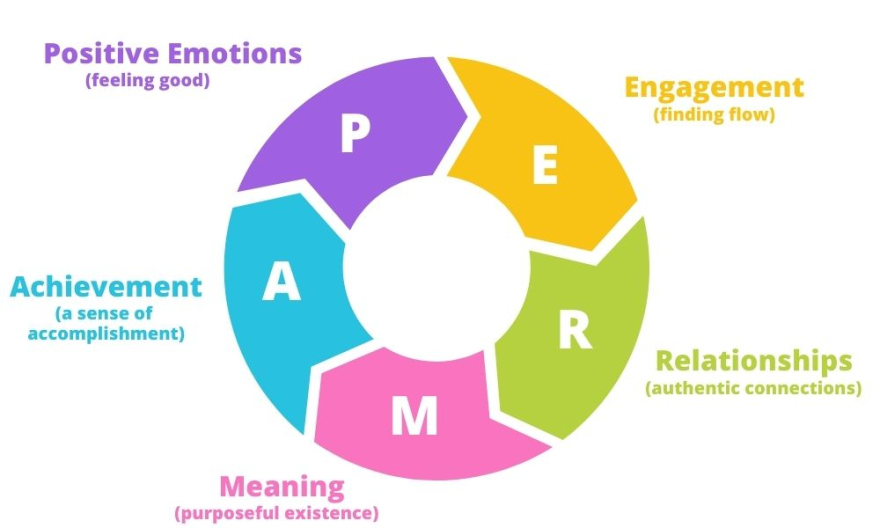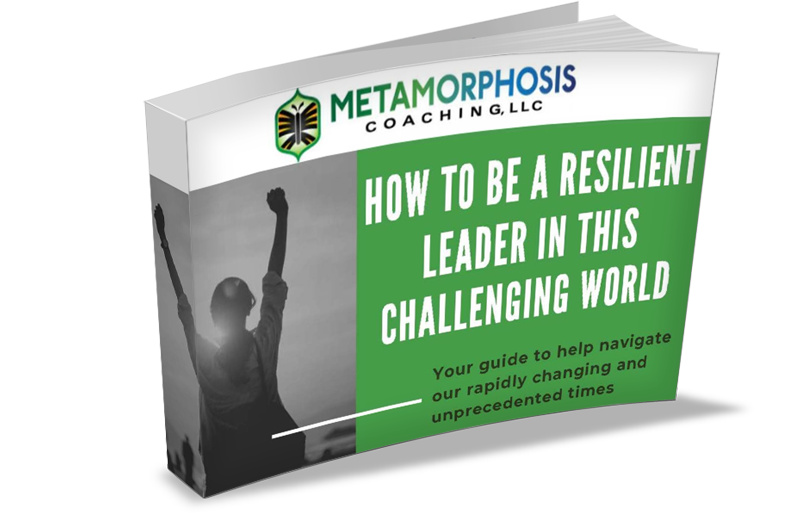Achievement as a Pathway to Flourishing: Focusing on Process to Fuel Outcomes

Achievement as a Pathway to Flourishing: Focusing on Process to Fuel Outcomes
by Doni Landefeld, Ph.D., ACPEC

It’s a fundamental component and the last in Martin Seligman’s PERMA model. In previous months, we explored Positive Emotion, Engagement, Relationships, and Meaning; this month our focus is Accomplishment. Seligman, a pioneer figure in positive psychology, introduced the PERMA model to condense what he considers the five core elements of psychological well-being and happiness. And I’d like to underscore how all of the elements correlate with high performance, reinforcing our focus on performance and well-being in the work we do with leaders and teams. Each component of the PERMA model contributes to our overall sense of fulfillment, and achievement, in particular, plays a crucial role in helping individuals reach their full potential.
Understanding Achievement in the Context of PERMA
Achievement, or Accomplishment, within the PERMA framework, refers to the pursuit and attainment of goals that are intrinsically and extrinsically motivated. It encompasses the satisfaction derived from mastery, success, and the tangible outcomes of one’s efforts. Achievement is not just about ticking off tasks from a to-do list; it’s about striving for excellence, realizing potential, and experiencing a sense of competence and fulfillment. And it’s also about enjoying the journey as much as the destination, reinforcing a focus on the process.
The Role of Goals in Achievement
Goals are the cornerstone of achievement. They provide direction, structure, and purpose. Well-defined goals can be short-term or long-term, and they help individuals focus their efforts, monitor progress, and maintain motivation. In the context of the PERMA model, the pursuit of meaningful goals is essential for well-being because it fosters a sense of purpose and direction.
Setting SMART goals—specific, measurable, achievable, relevant, and time-bound—can enhance the likelihood of success and the satisfaction derived from achievement. For example, a person might set a goal to learn a new language, run a marathon, or attain a professional certification. The process of working towards these goals and ultimately achieving them contributes significantly to one’s sense of accomplishment.
Intrinsic vs. Extrinsic Motivation
Achievement can be driven by both intrinsic and extrinsic motivations. Intrinsic motivation refers to engaging in activities for their own sake, out of interest and enjoyment. Extrinsic motivation, on the other hand, involves performing tasks to obtain external rewards or avoid punishments. Seligman emphasizes that while extrinsic rewards can be motivating, intrinsic motivation is often more sustainable and fulfilling in the long run. Much of the time, intrinsic goals are things that we pursue because we enjoy something; whereas an extrinsic goal may be to satisfy someone else, stay out of trouble or appeal to a material, superficial motivation.
Intrinsic motivation is linked to personal growth and self-determination. When individuals pursue goals that align with their values, interests, and passions, they are more likely to experience deeper satisfaction and a sense of achievement. For instance, an artist who creates for the love of art rather than for commercial success is likely to find greater fulfillment in their work.
The Importance of Mastery and Competence
Achievement is closely tied to the concepts of mastery and competence. Mastery involves developing and refining skills and abilities, while competence refers to the belief in one’s capability to achieve desired outcomes. Seligman’s PERMA model highlights the importance of feeling competent and effective in various domains of life.
When individuals perceive themselves as competent, they are more likely to take on challenges, persist in the face of adversity, and experience higher levels of self-esteem. This sense of competence is reinforced through accomplishments, whether they are big or small. Each success builds confidence and encourages further goal-setting and achievement.
The Impact of Achievement on Well-Being
Achievement contributes to well-being in several ways. First, it provides a sense of purpose and direction, which is essential for psychological health. The pursuit of meaningful goals gives life structure and significance, making individuals feel that their efforts matter.
Second, achievement enhances self-esteem and self-efficacy. Accomplishing goals, especially those that require effort and perseverance, boosts confidence and belief in one’s abilities. This positive self-perception is crucial for overall well-being and resilience.
Third, achievement fosters positive emotions such as pride, joy, and satisfaction. These emotions are integral to the PERMA model’s emphasis on positive emotion. Celebrating successes, no matter how small, contributes to a positive outlook and emotional well-being.
Challenges and Overcoming Obstacles
The path to achievement is not always smooth. Individuals often encounter obstacles, setbacks, and failures along the way. However, these challenges can also be opportunities for growth and learning. We don’t win or lose; we win or learn. And, it’s necessary to fail to achieve excellence (just listened to an awesome book on Learned Excellence. Seligman’s concept of learned optimism is relevant here; it involves developing a positive explanatory style to interpret setbacks as temporary and specific rather than permanent and pervasive.
Resilience is key to overcoming obstacles and maintaining a trajectory of achievement. Developing coping strategies, seeking support from others, and maintaining a growth mindset can help individuals navigate challenges and continue pursuing their goals.
Conclusion
Achievement is a vital component of well-being. It involves setting and attaining meaningful goals, developing competence, and experiencing the satisfaction of accomplishment. Achievement provides a sense of purpose, enhances self-esteem, and fosters positive emotions, all of which contribute to a flourishing life. By understanding and embracing the role of achievement within the PERMA framework, individuals can cultivate a more fulfilling and thriving existence.
Achieving a greater sense of accomplishment involves setting meaningful goals, maintaining motivation, and celebrating successes. Here are some practical tips to enhance your sense of accomplishment:
“It’s never the right time, but right now is usually the best time.” – James Clear
1. Set Clear and Achievable Goals
- Define SMART Goals: Ensure your goals are Specific, Measurable, Achievable, Relevant, and Time-bound. Clear goals provide direction and make it easier to track progress.
- Break Down Larger Goals: Divide bigger goals into smaller, manageable tasks. This makes them less overwhelming and allows for incremental progress and frequent achievements.
2. Prioritize and Plan
- Create a To-Do List: List tasks in order of priority. Tackling high-priority tasks first can lead to a greater sense of accomplishment.
- Use Time Management Techniques: Techniques like the Pomodoro Technique or time blocking can help maintain focus and productivity.
3. Maintain Motivation
- Identify Your “Why”: Understanding the underlying reasons behind your goals can keep you motivated. Reflect on how achieving these goals will positively impact your life.
- Visualize Success: Regularly visualize the successful completion of your goals. This can enhance motivation and make the goals feel more attainable.
4. Track Progress
- Keep a Journal: Documenting your progress can provide a tangible record of your achievements and reflect on how far you’ve come.
- Use Progress Indicators: Tools like charts, graphs, or apps can help visualize your progress and keep you motivated.
5. Celebrate Small Wins
- Acknowledge Achievements: Regularly celebrate small victories along the way. This can boost morale and provide a continuous sense of accomplishment.
- Reward Yourself: Give yourself rewards for reaching milestones. Rewards can be anything that you find enjoyable and motivating.
6. Develop a Growth Mindset
- Embrace Challenges: View challenges as opportunities for growth rather than obstacles. A growth mindset helps you learn from setbacks and persist in the face of difficulties.
- Learn from Failures: Analyze setbacks and failures to understand what went wrong and how you can improve. This approach turns failures into valuable learning experiences.
7. Seek Feedback and Support
- Get Feedback: Regular feedback from peers, mentors, or coaches can provide valuable insights and help you stay on track.
- Build a Support Network: Surround yourself with supportive and positive individuals who encourage and motivate you.
8. Practice Self-Compassion
- Be Kind to Yourself: Treat yourself with the same kindness and understanding you would offer a friend. Recognize that everyone makes mistakes and faces setbacks.
- Avoid Perfectionism: Understand that perfection is unattainable. Aim for progress, not perfection, and appreciate the effort you put in.
9. Stay Organized
- Create a System: Develop an organizational system that works for you, whether it’s digital tools, planners, or bullet journals.
- Declutter Your Environment: A clean and organized workspace can enhance focus and productivity.
10. Maintain a Healthy Work-Life Balance
- Take Breaks: Regular breaks prevent burnout and maintain productivity. Ensure you have time for rest and relaxation.
- Engage in Hobbies: Pursuing hobbies and activities you enjoy can provide a sense of accomplishment outside of work or primary goals.
11. Reflect and Adjust
- Regular Reflection: Take time to reflect on your progress, what’s working, and what’s not. Adjust your goals and strategies as needed.
- Set New Goals: Once you achieve a goal, set new ones to continue the cycle of accomplishment and growth.
12. Focus on Intrinsic Motivation
- Align with Values: Pursue goals that are meaningful and aligned with your values and interests. Intrinsically motivated goals are more fulfilling and sustainable.
- Find Joy in the Process: Enjoy the journey and the process of working towards your goals, not just the end result.
By implementing these strategies, you can cultivate a greater sense of accomplishment and enhance your overall well-being. Remember, achievement is a continuous process, and celebrating each step forward is crucial for maintaining motivation and satisfaction.
Imagine achieving more – we can help you and your team get more! To learn more, schedule a call with us:
CLICK HERE TO SCHEDULE A STRATEGIC DEBRIEFSpecial Report:
How to be a Resilient Leader in this Challenging World. PLUS More Free Resources!

Sign up below and get your FREE "How to Be a Resilient Leader in This Challenging World" Report today!

